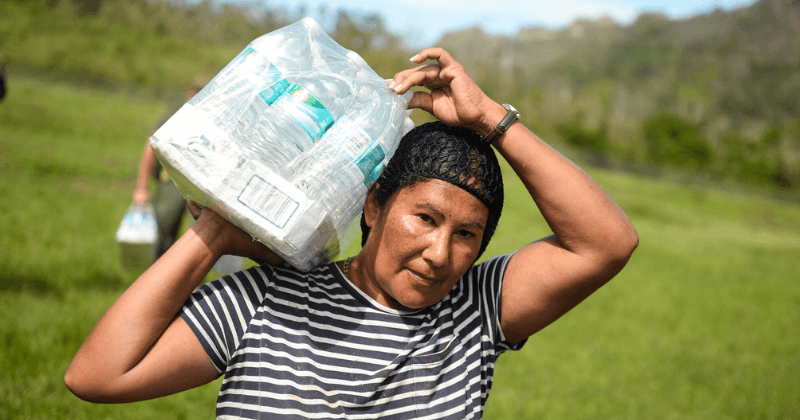
The current climate crisis is amplifying social inequities and disproportionately affecting the health and wellbeing of those already vulnerable due to social determinants of health such as income, housing, work, ethnicity, race and immigration status. While climate change is a global issue, some geographical areas have a higher risk of being impacted by extreme weather. Understanding how the climate crisis is impacting communities is critical in understanding the multifaceted strategies to prepare for and manage the impact of the crisis. This webinar will discuss how the climate crisis is impacting underserved and disenfranchised communities and culturally contextual strategies to address the health and wellbeing most impacted. The role of community health centers and the health center team will be highlighted through examples of work that has been done and is being done to build capacity and foster community resilience through community mobilization.
Watch the Webinar Recording
- Review the health impact of climate change and the characteristics of populations disproportionally affected by it.
- Discuss strategies to protect the health of climate-impacted populations.
- Identify resources and best practices to address climate-fueled disasters, including the role of community health centers using the community mobilization model.
Presenters

Marysel
Pagán Santana
DrPH, MS
Director of Environmental and Occupational Health, Senior Program Manager for Puerto Rico
Migrant Clinicians Network
Marysel Pagán Santana, DrPH, MS, serves as Director of Environmental and Occupational Health of Migrant Clinicians Network in Puerto Rico, where she leads and coordinates MCN projects related to occupational health, disaster preparedness, and emergency response. She is also the organization's lead for the Caribbean Office. Dr. Pagán Santana provides technical assistance, training, and tool development for community health centers in Puerto Rico and the communities they serve to address disaster-related issues and health-related impacts. Additionally, she is the project director of a USDA-funded project to support resiliency among farmworkers in Puerto Rico and the US Virgin Islands. She also provides training related to occupational health and safety to different populations of workers in Puerto Rico. Dr. Pagán Santana has extensive experience providing training to vulnerable and high-risk worker populations and carrying out community projects. She also has over eight years of experience in the private sector as an industrial hygienist and continues to offer them her professional consulting in the development and implementation of training programs in occupational and environmental health, emergency preparedness, and business continuity planning. In recent years, Dr. Pagán Santana has focused on assisting the response to COVID-19 in educational institutions in Puerto Rico, as well as supporting the PR Department of Health's response by offering training to personnel responsible for monitoring schools and businesses to promote the health of students and essential personnel in Puerto Rico. Dr. Pagán Santana has a Master’s degree in Industrial Hygiene and a Doctorate in Public Health with an emphasis on environmental health from the Medical Sciences Campus of the University of Puerto Rico.

Amy
Liebman
MPA, MA
Chief Program Officer
Migrant Clinicians Network
Amy K. Liebman, MPA, MA has devoted her career to improving the safety and health of disenfranchised populations. She joined Migrant Clinicians Network (MCN) in 1999 and currently serves as the Chief Program Officer. With MCN she has established nationally recognized initiatives to improve the health and safety of workers and their families, including foreign-born workers. She oversees programs ranging from integrating occupational and environmental medicine into primary care to designing worker safety interventions. She is a national leader in addressing worker safety through the community health worker (CHW) model. She has been a strong advocate for worker health and safety during the COVID-19 pandemic, leading programs to improve access to care and education for migrants and immigrants. Prior to her current position, she directed numerous environmental health projects along the US-Mexico Border including an award-winning, community-based hygiene education program that reached thousands of families living without water and sewerage services. She has spearheaded policy efforts within the American Public Health Association to support the protection of agricultural workers and served on the federal advisory committee to the EPA Office of Pesticide Programs. Her programs have won several awards including the 2008 EPA Children’s Environmental Health Champion Award and the 2015 National Safety Council Research Collaboration Award. In 2011, Liebman received the Lorin Kerr Award, an APHA/Occupational Health and Safety Section honor recognizing public health professionals for their dedication and sustained efforts to improve the lives of workers. In 2024, she was honored with the Shelley Davis Humanitarian Award for her commitment to improving farmworker health and safety. She is a past Chair of APHA’s Occupational Health and Safety. Liebman has been the principal investigator and project manager of numerous government and privately sponsored projects. She has authored articles, bilingual training manuals and other educational materials dealing with environmental and occupational health and migrants. Liebman has a master’s degree from the LBJ School of Public Affairs at the University of Texas at Austin, and a Master of Arts from the Institute of Latin American Studies at the University of Texas at Austin.